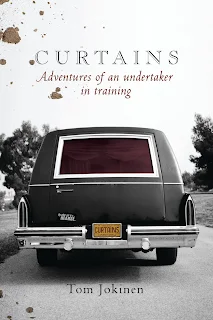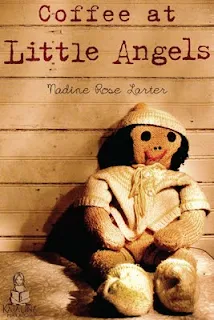 Today I'm interviewing Nadine Larter, author of Coffee at Little Angels. She's living in South Africa, so we're conversing by email.
Today I'm interviewing Nadine Larter, author of Coffee at Little Angels. She's living in South Africa, so we're conversing by email.
What was the inspiration behind Coffee At Little Angels?
A couple of years ago (and by a couple I think I might mean as many as six or seven, but I can't be sure) I lost an old high school friend in a car accident. I was devastated of course. This boy gave me my first kiss, he bruised my heart a couple of times, he provided wonderful friendship, endless headshakes, a friend and I even fought over him constantly - all those silly small-town dynamics were there. He had the most beautiful blue eyes you have ever encountered. He was sweet. He was charming. And he is possibly the only person who ever made me swear to him that I would never change. And then he died. And that just seemed ridiculous because..well..death is just kind of ridiculous, isn't it? Someone who used to be there just isn't anymore. And I couldn't escape the fact that he didn't really have to be dead for me. He could just be in my past. Like a whole bunch of other people who I never see anymore, but who I care about as people who were once upon a time part of my life. If I didn't think about how I would never see him again, then it wouldn't be so terrible. At least not for me.
The book is not about him. The relationships you find in that book are not relationships that ever existed. But it was just the idea. The idea of how much harder it would have been if he had died just a couple of years earlier. Really it was just an idea that came out of trying to process something that I wasn't sure how to respond to at the time.
The characters in your novel are well drawn, how closely do they represent people from your past or people you've known?
My sister is the only other person who has asked me this question. She asked before she read my book though and was mock offended that I never based anyone on her. These characters don't represent anyone from my past. I think perhaps when I picture Phil, I picture my friend, but the character is not the same as my friend. Just the hair and eyes.
I don't know if it's the same for other authors, but I like to create my own characters. If I create someone based on another person it is only very loosely. And when I say loosely, I might borrow a certain character trait here and there. But characters really do develop on their own. They decide on their own personalities as they go along. It's all very well and fine if you think to yourself "Oh this character is my friend Charlie" but if you don't let that character be who he wants to be and instead insist on making him the splitting image of "Charlie" I think you're almost doing your character an injustice. He knows who he wants to be. Let him be that person.
What's life like as an author in South Africa?
Can you ask me that again in a year? Or maybe ask someone else? Because I don't know yet. Thanks to the internet I know a few South African authors, and I must say I have grown to love them without even meeting them in person because I am so happy that there seems to be a community of "just writers" popping up. I love it.
I come from a small town where my education was really...well..I never learnt anything about literature at school! And I never got to jet off to university because it just wasn't financially viable when I finished high school. When it comes to "South African writers" my idea was always that we have some sort of obscure duty to make sense of apartheid for the rest of the world so that they can all understand what a dreadful and hideous thing it is blah blah blah. Now this is obviously a ridiculous assumption but it is one that has stunted and plagued me for a long time. I sort of got this idea in my head that if I wanted to be a writer I had to be very serious. I don't do very serious too well.
And then along came this wonderfully talented man called John van De Ruit and he changed everything for me. He wrote with humour and pure himselfness. And his novels have been so ridiculously successful. I think I cried through the first one thinking "Yes, John, this is how we must write!" After the first Spud book came out I stopped worrying about being an apartheid guru. I know nothing about it anyway! I didn't live through it. Things were like they were and it sucks. But I refuse to sell South Africa as an oppressed country. Are there problems? Hell yes! And some might make their way into my future novels, and that is fine. But you know what? My why-South-Africa-is-awesome list is a lot longer than my why-South-Africa-sucks list is. As for what it is like, I really just don't know yet.
Where do you like to write and can you describe your working space? Is it a mess or do you need a clean environment to write in?
I hate getting this question because it really feels as though I should come up with some sort of inspiring thing to tell you. Honestly? I write on my lap. In the lounge. In front of the TV! And what is on the TV? Barney...
Why do I work like this? Because my son bugs me less if I hang out in the same room as him! So, I know all the words to every single Barney song ever written. I know how to block him out of my head. And I have come to learn that if I have to write one sentence at a time between being told to clap (lots of clapping in Barney!) or dance, well that is just how it has to be. I imagine that once my kid starts preschool I will quickly get used to and take advantage of a few hours of quiet, but until then I just do what I can when I can. And why do I not send him to day care, I hear you ask. Well, I will send him to day care as soon as he can talk properly. If he can't tell me that there is something wrong then I want him home with me where I know what's going on in his life. That may be the scary single mom in me... but I can't help it!
Anyway, as long as there is no tension I can work. If people are sulking or angry at each other I can't work. Chaos stresses me out. And ringing phones and doorbells! They mess with my mojo. But my son and I have developed a symbiotic existence. When it's just the two of us (and Barney) we do just fine.
How do you prioritise your writing between emails, admin, blogs (given you are involved in 3) and novel writing?
*curls up into a ball and sobs*
I haven't figured out how to do it yet. I am constantly swamped with all sorts of things. I took the weekend off last weekend, and woke up on Monday with flu and 122 emails to respond to. I nearly cried. Sometimes all I want to do is skip this part and just go back to writing. But at the same time I am loving every minute. I am loving meeting reviewers. I am loving the response to my work. I am loving doing the marketing and learning about printing and all sorts of things that I knew nothing about before. Every step has been an achievement for me. And that is quite a thing when it is something you care about. I have never felt this way about a job before. Once I have a pile of novels on my lounge floor I am going to have to take a break and re-assess everything. Figure out how to fit it all in. I am certainly my father's child in that I can work 18 hour days without blinking, but the family is not always so pleased about that! So I will have to figure a few things out. For now I am juggling and trying not to beat myself up about the balls that get dropped from time-to-time.
Are you working on a new novel at the moment, or are you focusing on your blogs?
My blogs are really at the mercy of my whimsy most of the time. I contribute to them when I have something to say. I don't really force things as far as they are concerned. My poetry blog needs some serious TLC and I will soon be trying to sort it all out. I am going to have to bring on someone new to help keep things running smoothly. I do have someone in mind. I just need to give myself the time to focus on it all properly. Otherwise I have a completed novel that needs to be shredded and rewritten. It's called The Tequila Thursday Writing Club and I am very eager to get back to it.
If you had 20 words to convince a reader to read your book, what would they be?
You know what the best part about my book is? It's short! Perfect for moms!
What's the best book you've read so far this year?
Geek Love by Katherine Dunn, I think. What insanity! I loved it! Or We Need to Talk About Kevin by Lionel Shriver. Both were brilliant. I think I possibly have a thing for sociopaths...
Thank you so much Nadine, and best of luck with your next novel.
 Paul McDonnold's e-book 5 Pillars, 7 Sins: A Novella is now available to download for FREE!
Paul McDonnold's e-book 5 Pillars, 7 Sins: A Novella is now available to download for FREE!





















































